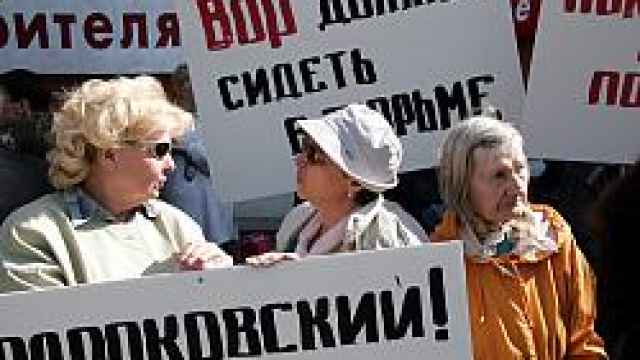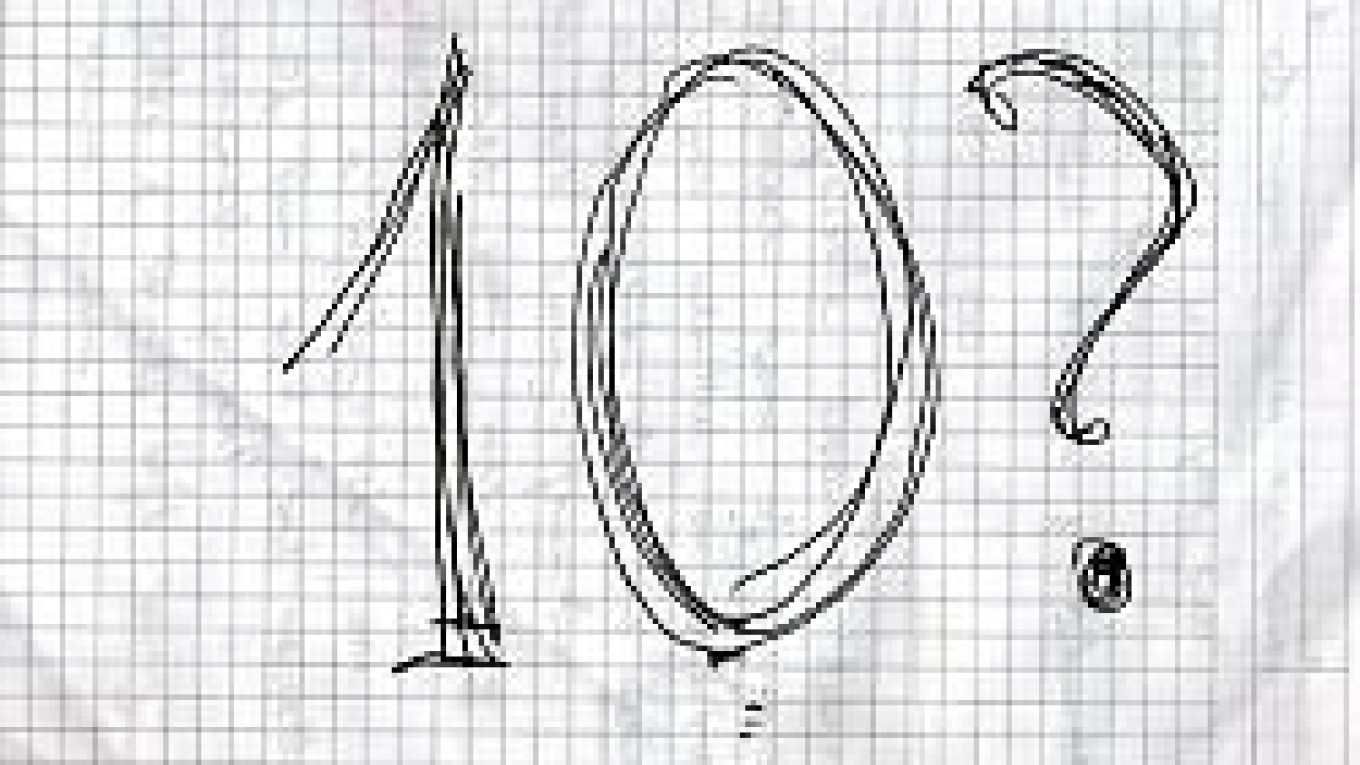In front of him -- unseen by anyone else in the packed courtroom -- was the question that has been on everyone's lips since the judges began reading the sheaves of papers containing their verdict on Monday.
Scribbled on a reporter's notepad were a single number and a question mark: "10?"
Khodorkovsky shrugged, thought for a second, then smiled ironically and surreptitiously drew the mathematical sign for infinity with his finger in the air.
Khodorkovsky's gesture of resignation, shortly after noon Wednesday, came as an indication that he sees no end to the state's persecution. He and his business partner Platon Lebedev face sentences of up to 10 years in jail on charges of fraud, embezzlement and tax evasion -- and the prospect of further charges after this sentence is handed down.
From his position in the defendants' cage in the cramped and stuffy Meshchansky District Court, Khodorkovsky, like anyone on trial in Russia, is allowed to talk only to his defense lawyers.
Sometimes, if the court guards standing next to the cage turn a deaf ear, defendants can exchange whispers with family members or friends as they pass by entering or leaving the courtroom. Most communication with family, friends and the press is carried out by means of nods, signals and glances.
But even the briefest of exchanges between Russia's former richest man and his relatives on Wednesday appeared to indicate that he has had enough.
"I am now plugging my ears," he told his mother, Marina, during a break in proceedings.
During some of the more mind-numbing stretches of the judges' rote-like reading of the verdict, the tedium was only relieved when the judges found difficulty in pronouncing foreign words, such as "foundation," "Guernsey" and "Lichtenstein."
"I thought that it couldn't get any more interesting than [during the case put by] the Prosecutor's General's Office, but it has," Khodorkovsky said, with a hint of an ironic smile playing on his lips, after chief judge Irina Kolesnikova adjourned the session early, for a third day running, until Thursday morning.
Throughout Wednesday's 3 1/2-hour reading of the verdict, which almost word-for-word continued to repeat the prosecutors' original charges, judges showed no sign that any of the defense lawyers' months of arguments or the defendants' denial of any wrongdoing had been taken into account by the court.
Both Khodorkovsky and Lebedev shook their heads from time to time in apparent disbelief and resignation.
The same mood of resignation also appeared to be taking its toll on the lawyers defending Khodorkovsky and Lebedev, who in private remarks admitted that they had a hard time fighting the urge to leave the courtroom on Wednesday, as all their work appeared to have gone in vain.
"It's all just busy work," a defense lawyer snapped, between quick puffs on a cigarette during a break.
 Michael Eckels / MT Three women standing near the Meshchansky Court on Wednesday with signs calling for Khodorkovsky to be jailed. | |
"This is not a trial. It's a real settling of scores," Shmidt said.
Khodorkovsky's father, Boris, also indicated Wednesday that his hopes for a relatively light sentence or some kind of happier ending had faded.
"This is a show," he said. "I don't expect anything good to come out of it."
According to Khodorkovsky's chief defense lawyer, Genrikh Padva, the reading will likely take at least a few days. By the end of the three judges' third day of reading the verdict's hundreds of pages, they had only just started the second of the requisite four stages.
By law, in the first part of the verdict judges announce whether they have established the defendants' guilt on each count. Part two is the analysis of proof, while the third part establishes the degree of guilt. In the final stage, the court pronounces sentence.
In another sign that the reading of the verdict would take at least a few more days, the remaining pile of pages of the verdict yet to be read still towered a good few centimeters above the pages already read.
The judges' reading of the verdict is scheduled to resume at 10:30 a.m. Thursday.
A Message from The Moscow Times:
Dear readers,
We are facing unprecedented challenges. Russia's Prosecutor General's Office has designated The Moscow Times as an "undesirable" organization, criminalizing our work and putting our staff at risk of prosecution. This follows our earlier unjust labeling as a "foreign agent."
These actions are direct attempts to silence independent journalism in Russia. The authorities claim our work "discredits the decisions of the Russian leadership." We see things differently: we strive to provide accurate, unbiased reporting on Russia.
We, the journalists of The Moscow Times, refuse to be silenced. But to continue our work, we need your help.
Your support, no matter how small, makes a world of difference. If you can, please support us monthly starting from just $2. It's quick to set up, and every contribution makes a significant impact.
By supporting The Moscow Times, you're defending open, independent journalism in the face of repression. Thank you for standing with us.
Remind me later.


